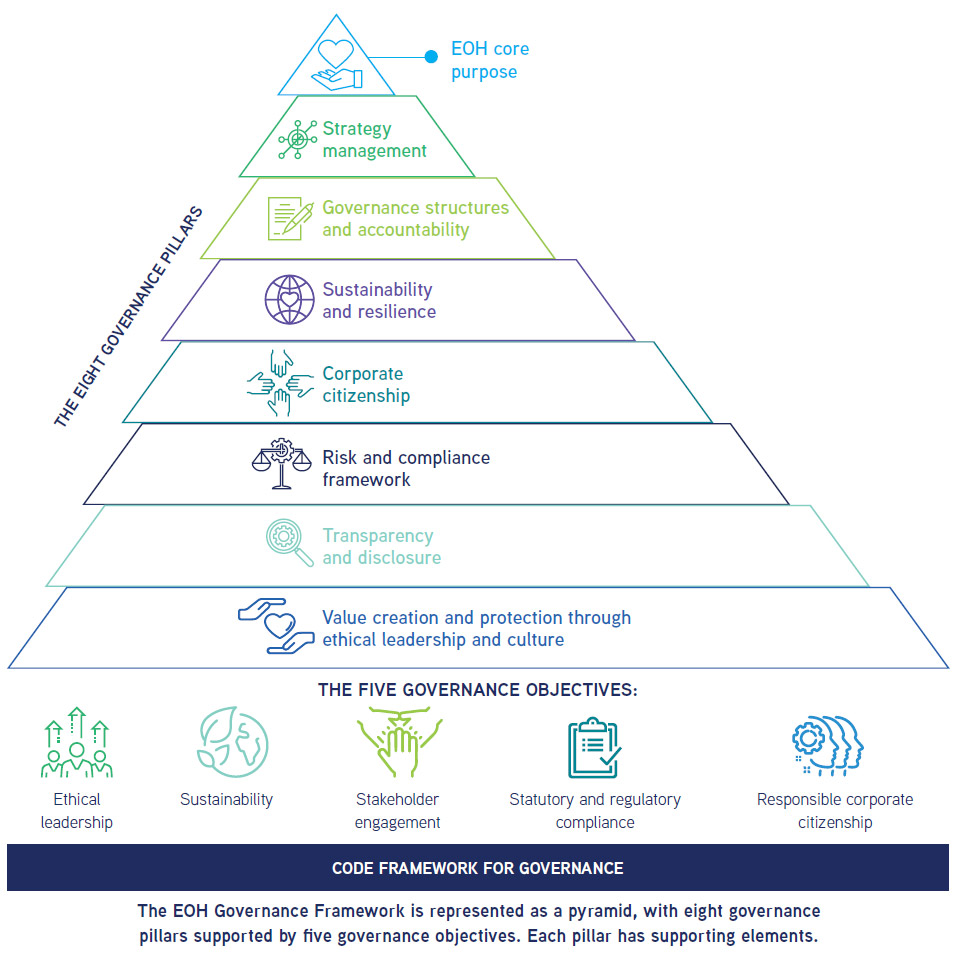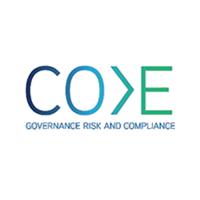2019
Integrated report

Currently viewing: Governance Report / Next: EOH Board of Directors
EOH has appointed a new Board and aligned governance structures to the principles of the King IV Report on Corporate Governance as well as JSE Listings Requirements. We are ready to recover, create and protect value, leveraging a refreshed and best practice governance framework, supported by courageous leadership.
Our new Board brings a wealth of skill and experience to bear, coupled with a profound commitment to ethical and effective leadership. Much work has been done already to create a foundation that is fit for our future. We have not worked alone. The EOH Board has taken considerable advisory input from some of South Africa's finest independent assessors, legal, governance, investment, and risk management organisations, including both professional and academic organisations. This has included:
It has, at times, felt like the re-writing of the South African Constitution following 1994, as the best experience from multiple sectors has contributed to the redefinition of a governance framework that is fit to enable the ethical and effective leadership we need to atone for our past, and to enable a future that creates value for all our stakeholders. We have taken a highly consultative approach to the design, planning and implementation of a governance framework and blueprint that is world class.
We have taken a singularly transparent approach to leaving no stone unturned relating to our existing capabilities and our baseline position. We have scrutinised our governance functions, processes, and executive and governance support roles to understand our baseline. The root cause behind the damage sustained during 2019 was that we had grown fast, through acquisition, and corporate governance structures were superficial and deeply under-resourced. The oversight functions, professional skills, and audit capabilities needed to enable the flow of accurate, complete and proper information were limited, or in some cases were simply not in place. Looking in retrospect at the EOH Integrated Report for 2018, one could be forgiven for believing that the governance framework it defined was fit-for-purpose, and consistent with other companies of our size and in our sector. The harsh reality was that below the waterline, the business information needed to enable good decisions was unavailable due to a lack of functional capability.
We are committed to ensuring that we do not make the mistakes of the past. We have done much to mobilise new functional capabilities and people, with an entirely new internal audit capability, and a governance framework that is fit for the future. We have restructured into organisational pillars that are simplified to the point that control, risk management and good decision making can be realistically overseen. We have recruited skilled and talented professionals to fill gaps. We have a foundation and a baseline. However, this is not yet enough.
In 2020 we need to continue the road ahead: we need to embed our solution. If you review our risks, you will see that we need to continue to work to ensure that we have integrated business information, and to ensure that standardised corporate processes are implemented. We need to assure adoption and compliance in a way that does not crush our entrepreneurial, innovative and creative spirit.
Leaders are effective because of their followership. Ultimately our governance will not be successful just because a new framework exists. It will be effective because we have successfully engaged with people who have aligned to operate within it. Our leaders need to be courageous, ethical, effective, motivational, tenacious and astute in their leadership of the change ahead.
This report showcases our refreshed corporate governance leadership team. We have defined 'courageous leadership' as a commitment and requirement in South Africa. It is a difficult time to be a leader of corporate governance. The risk of reputational damage becomes a reality all too often. EOH is proud of the team that it presents. That leaders of this calibre are prepared to commit to the ethical and effective delivery of their role at EOH at this time is a milestone that represents a starting success. Governance meetings did not follow the normal schedule this year, as much of our focus drew our leaders together in top level forums to mitigate damage and plan our future. Most of our governance structures are newly mobilised, with fresh mandates. We salute these fresh teams, and their courage in taking the hard road ahead, toward value creation for all our stakeholders.
We are ready for 2020.
Our best practice governance framework has been approved by the Board and guides the supporting executive oversight function and capabilities needed to ensure ethical and effective leadership that creates and protects value for all our stakeholders.

EOH is committed to the highest standards of business integrity, ethics and professionalism. The Board and executive management, in setting the tone from the top, are committed to the principles of good governance, striving to be an ethical, relevant force for good and to play a positive role in society.
We define corporate governance as exercising ethical and effective leadership to direct and manage effective governance and standards of accountability and transparency within the Company. Good governance is implemented through a best practice governance framework that aligns to the principles of the King IV Report on Corporate Governance™ for South Africa, 2016 (King IV), as well as the governance requirements of the JSE Listings Requirements and the Companies Act. The governance framework provides an integrated approach to connect critical factors that affect EOH's ability to create and protect value for all stakeholders in a sustainable way.
The EOH governance structure arises from the fiduciary obligations and responsibilities of directors as defined by the Companies Act and King IV best practice principles of oversight and control. It is based on the accountability line of authority and is applicable to all businesses in the Group to ensure the governance objectives are met.
The EOH governance objectives stem from the Board Charter and Board committee terms of reference and align with the EOH purpose, philosophies and values.
1. Ethical leadership and culture
2. Sustainability and growth
3. Stakeholder engagement
4. Statutory and regulatory compliance
5. Responsible corporate citizenship
We have branded our programme to deliver the governance objectives as CODE. Delivery of this programme to embed governance will be a major focus throughout 2020, focused on building the functional capabilities needed to futureproof EOH.
The seven pillars of EOH's governance framework represent the key processes or mechanisms applied to effectively uphold, sustain, defend and enforce the ethical values of good governance throughout the Company. Each of the seven governance pillars has defined critical value elements. These value elements are the key building blocks that ensure that the Group's objectives of good governance are implemented and continuously pursued.
1. Ethical leadership and culture
2. Transparency and disclosure
3. Risk and compliance framework
4. Corporate citizenship framework
5. Sustainability and resilience
6. Governance structures and accountability
7. Strategy management
The governance pillars are inherently aligned to our philosophies and our purpose.
The EOH governance framework arises from the fiduciary obligations and responsibilities of directors as defined by the Companies Act and King IV best practice principles of oversight and control. It is based on the accountability line of authority and is applicable to all businesses in the Group to ensure the governance objectives are met.
| Governance pillar | Description The seven pillars of EOH's governance framework represent the key processes or mechanisms applied to effectively uphold, sustain, defend and enforce the ethical values of good governance throughout the Company. |
|
Ethical Leadership and Culture |
EOH recognises that ethical and effective leadership are key imperatives that complement and reinforce each other. EOH is committed to be an ethical and relevant force for good and to play a positive role in society, beyond normal business practice. Scope of processes and mechanisms
|
|
Transparency and Disclosure |
EOH is committed to being an organisation that creates best-in-class governance and transparency, while retaining the entrepreneurial and innovative spirit that has made the Group the most successful ICT business in Africa. Scope of processes and mechanisms Reporting excellence
Data and information management
|
|
Risk and Compliance |
EOH inculcates an ethical culture of informed risk taking through best-in-sector practices that foster a consistent approach to integrating and optimising decisions around strategy, risk and performance. Scope of processes and mechanisms
|
|
Corporate Citizenship |
The EOH Social and Ethics Committee assists the Board with matters relating to good business practice, ethical conduct and transformative social action to promote EOH's purpose of being a force for good. Scope of processes and mechanisms
|
|
Sustainability and Resilience |
EOH best practice in sustainable development and human capital management, change management, business continuity and resilience management, reputation and brand management, and execution project management. Scope of processes and mechanisms
|
|
Governance Structures and Accountability |
Defines clear EOH responsibilities and accountability for governance, risk, compliance and assurance at all levels within EOH. The Board and sub-committees provide ongoing governance oversight over the respective pillars of governance established. Scope of processes and mechanisms
|
|
Strategy Management |
The Board recognises that EOH's core purpose, risks and opportunities, strategy, business model, performance and development are all inseparable elements of the sustainable value creation process. Our core purpose drives the development of the Board-approved business strategy that steers and sets the Company's direction, strategic targets and objectives. The Board approves the resources and relationships connected to the various forms of capital that are required to implement the strategy. Scope of processes and mechanisms
|
This framework governs the statutory and regulatory obligations and responsibilities of the Group and will be regularly reviewed by the Governance and Risk Committee to ensure that governance objectives are met, in line with King IV Principle 11. This will include structures, policies and procedures to ensure that they are resilient and robust and aligned to best practice.
Key performance measures and targets for ensuring the full adoption and compliance with the governance framework falls under the mandate of the EOH Chief Risk Officer, who is responsible for embedding the framework across the wider EOH enterprise to ensure full compliance across the relevant executive functions responsible for delivery.
Key performance measures and targets for assessing the status on embedding the framework to futureproof the EOH enterprise will be reported on to the relevant governance committees for scrutiny and advisory input to ensure ethical and effective leadership.
A great deal of work has been done. However, there is more work to do to embed group-wide long-term resilience. We have  , which is a strategy and plan to end corruption by embedding governance risk and compliance management that creates sustainable value for all our stakeholders.
, which is a strategy and plan to end corruption by embedding governance risk and compliance management that creates sustainable value for all our stakeholders.

The objective of the CODE programme is to embed best practice and sustainable governance and risk management throughout the EOH Group, by the end of 2020.




